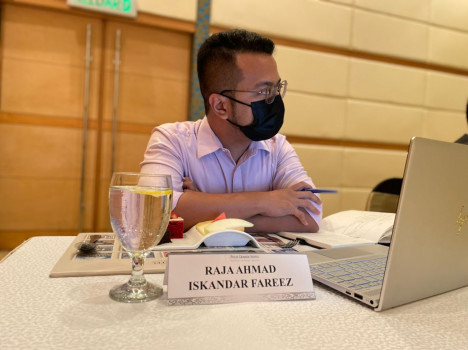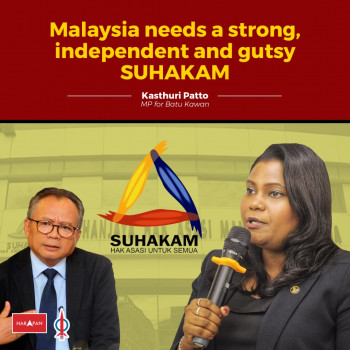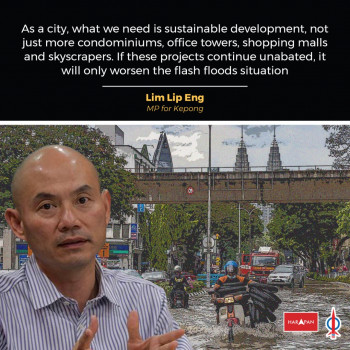by Mohammad Abdul Hamid, IKRAM Wilayah Persekutuan
Much has been written about hudud in recent weeks. In many of the writings, one would find such words as theocratic state, authoritarian, infringement on individual as well as women’s rights, moral policing and even barbaric.
Modern Saudi Arabia and Iran have often been quoted as examples of Islamic states ruled by religious authorities; never mind that some practices in these countries are far removed from the true teachings of Islam.
In Saudi Arabia, any voice of opposition to the government is suppressed with such laws as The Press and Publications Law. Such a practice is un-Islamic. On the contrary, a true Islamic state would allow for dissent and differences in opinions. In Islam, any citizen has the right to voice dissatisfaction to the government when she sees that the government is unfair or does not serve for the best interest of the people.
Similarly, the much publicized banning of women from driving is not an Islamic teaching. It does not help that Saudi Arabia is the guardian of two holy sites where millions of Muslims perform their pilgrimage each year. The country is well regarded by many Islamic countries and the world Muslim population.
Iran has also been regularly quoted as a Islamic State even though the Syiah sets of beliefs and practices are fundamentally different from the Sunnis which are practiced in majority Islamic countries. The Iranian government probably has one of the worst track records for peace. It is a strong supporter of the current Syrian regime which had killed more than 100,000 of its own people in the on-going civil war.
Any right minded Muslim would know that such a government that promotes violence and crimes against fellow human beings, Muslims or otherwise, is un-Islamic.
Unfortunately, public perceptions about Islam and hudud have been shaped against this background.
Back home, the hudud issue is of national interest as it affects all Malaysians, Muslims and non-Muslims alike. After winning the general election in 1990, the Kelantan state government has been attempting to implement the hudud laws. The issue has been a topic of hot discussion for political leaders.
We understand that hudud cannot be implemented in Kelantan as various processes are required including approval at the Federal Government level. There is also a question regarding the legitimacy of implementing hudud within the framework of the Federal Constitution. Many also feel that hudud is not suitable in pluralistic Malaysia.
Since then, Malaysians have been going through several general elections with hudud issue being raised in one way or another. One would imagine that after more than 20 years, the country would have progressed very far in the hudud issue, at least through mature debates if not for the actual implementation.
Unfortunately, this is not the case, at least not what we see in the media even thoughthe political climate has changed dramatically since the early nineties.
It is interesting to note that the hudud issue is probably the most popular and controversial topic in modern Malaysian politics despite the fact that it does not lead the country to anywhere better after such a long time. It is not surprising then if many Malaysians believed that the issue is merely raised for political gains.
There is a saying that politics is a game of perception. If one were to study the hudud debates in Malaysia over the years, it would not be surprising if the findings show that the Malaysian public perception has been successfully shaped to achieve the agenda of certain groups.
While some politicians are benefitting from the hudud issue, Malaysians from all walks of life continue to face many problems including rising cost of living, increasing crimes, social ills, unaffordable housing and child abuse. These issues affect the day-to-day life of all Malaysians. High cost of living continues to burden city dwellers.
People feel less safe and many residential areas chose to implement gated and guarded communities to minimize robberies and petty crimes. In urban areas, many people find it difficult to own a house.
The fact that hudud is only one aspect of Islam does not seems to interest the politicians or the media, or it is intentionally left out as it does not benefit any parties perhaps.
It is perplexing to see that public discussions do not dwell on hudud in a wider perspective rather than discussing it as a stand-alone, isolated topic which more often than not gives an unfair portrayal of Islamic systems and laws. Why our leaders are so focused on the hudud issue when many other bigger and urgent problems facing ordinary
Malaysians have not been properly addressed? If it is to satisfy the Muslims populace, aren’t issues such as increasing crimes, accountability, transparency and rising cost of living Islamic? What about the other shariah practices those are more important than hudud? Why are we selective in our debates and discussions?
It goes without saying that Islam upholds the rule of law, independent judiciary, promotes fair distribution of wealth, guarantees access to education for all citizens, commits to healthcare access for everyone and allows freedom of speech regardless of creed, color or gender.
Islam promotes peaceful co-existence between Muslims and non-Muslims and these have been demonstrated when Islam, in its true form, ruled many territories centuries ago. Islam respects the rights of non-Muslims to practice their beliefs and cultures and to conduct their daily lives freely. Islam recognizes individual freedom for each citizen, but Islam treats the interest of communities and country higher than individual interest.
In Islam, any citizen has the right to advice the government when she sees that the government does not serve for the best interest of the public. Islam calls for prudent spending of a country’s income and promotes transparency in the way governments carry out their businesses.
It is also worth noting that priority setting is also a key consideration in implementing Islam and governing a country. Thus any policies or programs must be accorded its rightful place in the priority list so that sufficient resources can be allocated for implementation.
It appears that the divide-and-rule formula is still in force, intentionally or not. Race and religion cards are still used by political parties for various purposes, children still go to different types of schools including vernacular schools, and the income gap between the rich and the poor seems to open wider.
There seems to be invisible walls between different communities preventing mutual understanding between each other, including hot topics such as hudud. Little wonder not much has been achieved to promote healthy public debates. -The Rocket



